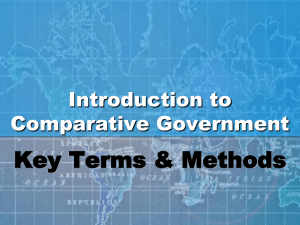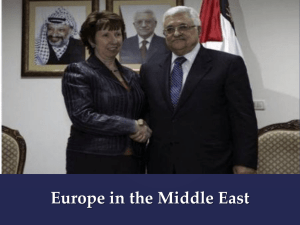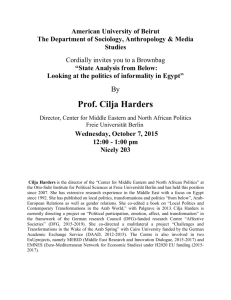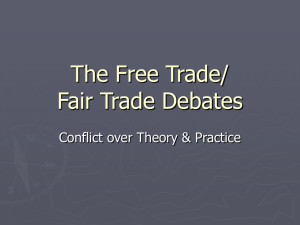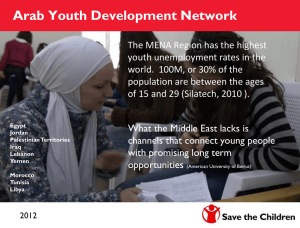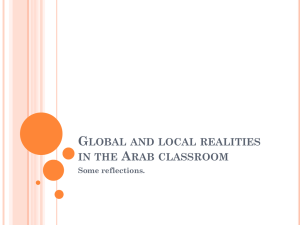The American University in Cairo
advertisement
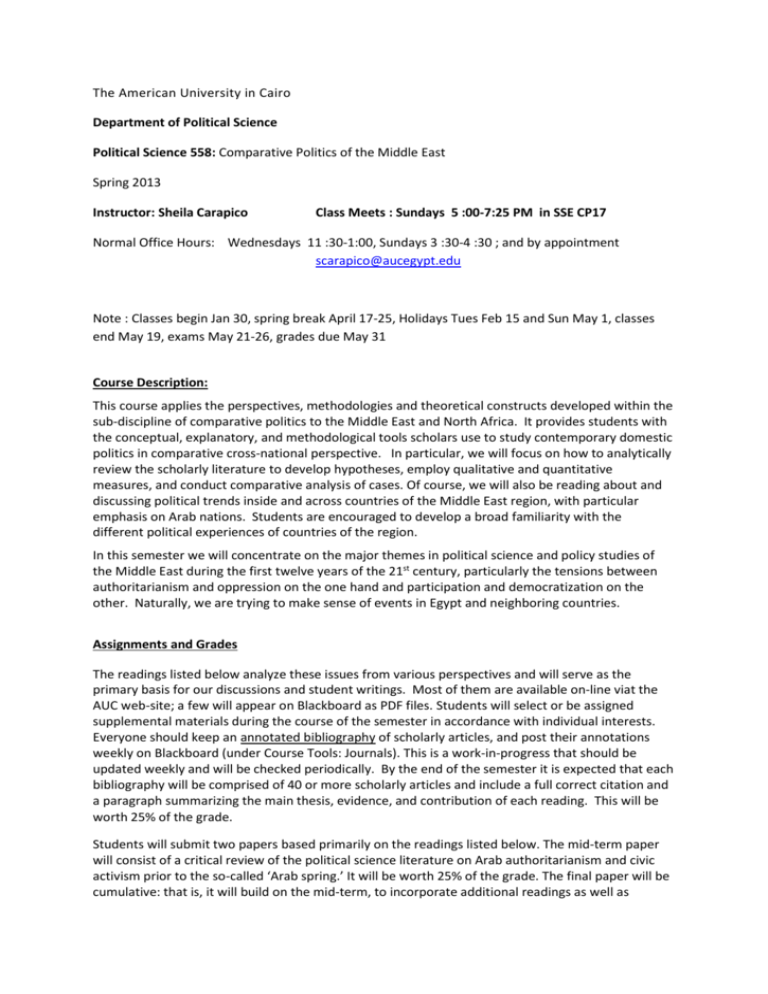
The American University in Cairo Department of Political Science Political Science 558: Comparative Politics of the Middle East Spring 2013 Instructor: Sheila Carapico Class Meets : Sundays 5 :00-7:25 PM in SSE CP17 Normal Office Hours: Wednesdays 11 :30-1:00, Sundays 3 :30-4 :30 ; and by appointment scarapico@aucegypt.edu Note : Classes begin Jan 30, spring break April 17-25, Holidays Tues Feb 15 and Sun May 1, classes end May 19, exams May 21-26, grades due May 31 Course Description: This course applies the perspectives, methodologies and theoretical constructs developed within the sub-discipline of comparative politics to the Middle East and North Africa. It provides students with the conceptual, explanatory, and methodological tools scholars use to study contemporary domestic politics in comparative cross-national perspective. In particular, we will focus on how to analytically review the scholarly literature to develop hypotheses, employ qualitative and quantitative measures, and conduct comparative analysis of cases. Of course, we will also be reading about and discussing political trends inside and across countries of the Middle East region, with particular emphasis on Arab nations. Students are encouraged to develop a broad familiarity with the different political experiences of countries of the region. In this semester we will concentrate on the major themes in political science and policy studies of the Middle East during the first twelve years of the 21st century, particularly the tensions between authoritarianism and oppression on the one hand and participation and democratization on the other. Naturally, we are trying to make sense of events in Egypt and neighboring countries. Assignments and Grades The readings listed below analyze these issues from various perspectives and will serve as the primary basis for our discussions and student writings. Most of them are available on-line viat the AUC web-site; a few will appear on Blackboard as PDF files. Students will select or be assigned supplemental materials during the course of the semester in accordance with individual interests. Everyone should keep an annotated bibliography of scholarly articles, and post their annotations weekly on Blackboard (under Course Tools: Journals). This is a work-in-progress that should be updated weekly and will be checked periodically. By the end of the semester it is expected that each bibliography will be comprised of 40 or more scholarly articles and include a full correct citation and a paragraph summarizing the main thesis, evidence, and contribution of each reading. This will be worth 25% of the grade. Students will submit two papers based primarily on the readings listed below. The mid-term paper will consist of a critical review of the political science literature on Arab authoritarianism and civic activism prior to the so-called ‘Arab spring.’ It will be worth 25% of the grade. The final paper will be cumulative: that is, it will build on the mid-term, to incorporate additional readings as well as 2 evidence from five or more countries. The final paper will be worth 50% of the final grade. To receive full credit all papers must be typed and submitted in hard copy to the professor during class on the day assigned, and include a bibliography of full correct citations to works consulted that should include most or all of the readings listed below. Rules and Regulations Blackboard: All members of the class must enter their AUC email addresses on Blackboard. Absence Policy: This class meets once a week. Graduate study must be a priority for students enrolled in a Master’s degree program. All members of the seminar are expected to complete reading and writing assignments according to this syllabus, and to attend every weekly class. Those who prepare for and attend every class will be considered ‘serious.’ Two consecutive absences or a total of three absences will result in a grade reduction; more than three absences may be considered withdrawal from the class. Academic Integrity Policy: The Political Science Department has a policy of zero-tolerance for plagiarism and academic dishonesty. Read the University Code of Ethics and check the webpage on academic integrity at: http://www.aucegypt.edu/resources/acadintegrity/. Trip Gabriel, in an article entitled “Plagiarism Lines Blur for Students in Digital Age” for The New York Times August 1, 2010 wrote that these days “many students simply do not grasp that using words they did not write is a serious misdeed.” He saw a disconnect “growing in the Internet age as concepts of intellectual property, copyright and originality are under assault.” Not only does digital technology make it easy to copy and paste, he argued, but the internet “may also be redefining how students — who came of age with music file-sharing, Wikipedia and Web-linking — understand the concept of authorship and the singularity of any text or image.“ Yet students and professionals need to respect authorship and the importance of citing sources. As Patrick Pexton wrote in the Washington Post on January 18, 2013 about a case of (perhaps inadvertent) plagiarism by a reporter for his newspaper, even though it sometimes seems that “technology made us all plagiarists,” it is a firm principle of research, writing, and fact-checking that “we give credit where credit is due. Every day, every time.” We will attend to these issues not primarily to avoid accusations of cheating but in order to appreciate and implement the high standards of documentation in both academic and human rights publications. Sources of information and methodologies for gathering and analyzing information matter a great deal. In other words: full correct citations are required on all work submitted. 3 Feb 3: Introductions Feb 10: Arab Authoritarianism Diamond, Larry, “Why Are There No Arab Democracies?” Journal of Democracy 21:1 2010 (93-112) Bellin, Eva “The Robustness of Authoritarianism in the Middle East: Exceptionalism in Comparative Perspective,” Comparative Politics, 36: 2, 2004 (139-157) King, Stephen J., “Sustaining Authoritarianism in the Middle East and North Africa,” Political Science Quarterly 122:3, 2007 (433-459) Posusney, Marsha Pripstein, “Enduring Authoritarianism: Middle East Lessons for Comparative Theory,” Comparative Politics, 36: 2, 2004, pp. 127-138 Feb 17: Comparative Perspectives and Methods These articles are useful for comparative perspective and also as models of formal comparative methodology. Spinks, B. Todd, Sahliyeh, Emile and Calfano, Brian, “The Status of Democracy and Human Rights in the Middle East: Does Regime Type Make a Difference?” Democratization, 15: 2, 2008 (321 - 341) Allain, Jean, and O'Shea, Andreas, “African Disunity: Comparing Human Rights Law and Practice of North and South African States,” Human Rights Quarterly 24: 1, 2002, pp. 86-125 Fox, Jonathan and Shmuel Sandler, “Separation of Religion and State in the Twenty-First Century: Comparing the Middle East and Western Democracies,” Comparative Politics, 37: 3, 2005, pp. 317335 Rauch, James E. and Scott Kostyshak, “The Three Arab Worlds,” The Journal of Economic Perspectives 23: 3, 2009 (165-188) Feb 24: The Politics of Regime Maintenance We will all read Kausch’s report and pay attention to her comparative table. Students should read and annotate at least three other articles from the list below, and be prepared to present a summary of the article to the class. Kausch, Kristina, “Managed Successions and Stability in the Arab World,” Fundación para las Relaciones Internacionales y el Diálogo Exterior (FRIDE) 2010, Madrid, Spain, http://www.fride.org/publication/837/managed-successions-and-stability-in-the-arab-world Brownlee, Jason, “Hereditary Succession in Modern Autocracies,” World Politics 59, 2007 (595–628) Albrecht, Holger and Oliver Schlumberger "Waiting for Godot": Regime Change without Democratization in the Middle East," International Political Science Review 25: 4, 2004 (371-392) Herb, Michael, “Princes and Parliaments in the Arab World,” Middle East Journal 58: 3, 2004 (367384) Lust-Okar, Ellen, “Divided They Rule: The Management and Manipulation of Political Opposition,” Comparative Politics, 36: 2, 2004 (159-179) 4 Posusney, Marsha Pripstein, “Multiparty Elections in the Arab World: Institutional Engineering and Oppositional Strategies,” Studies in Comparative International Development 36:4, 2002 (34-59) Lust, Ellen, “Competitive Clientelism in the Middle East,” Journal of Democracy, 20: 3, 2009 (122135) Ellen Lust-Okar, Ellen and Amany Ahmad Jamal, “Rulers and Ruled: Reassessing the Influence of Regime Type on Electoral Law Formation,” Comparative Political Studies, 35: 3, 2002 (337-366) Mar 3: Activism and Civil Society My chapter below (see PDF on Blackboard) is mainly for reference. Select four or more of the following articles to read and annotate. Carapico, Sheila, “Civil Society,” in Angrist, Michele (ed.) Politics and Society in the Contemporary Middle East, Second Edition, Boulder: Lynne Reinner 2013 Sadiki, Larbi, “Popular Uprisings and Arab Democratization,” International Journal of Middle East Studies, 32: 1, 2000 (71-95) Hicks, Neil, “Does Islamist Human Rights Activism Offer a Remedy to The Crisis of Human Rights Implementation in the Middle East?” Human Rights Quarterly, 24: 2, 2002, (361-381) Zayani, Mohamed, “Civil Society and Democratic Change in the Arab World: Promises and Impediments,” Comparative Studies of South Asia, Africa and the Middle East 32: 3, 2012 (674-685) Salime, Zakia, “Mobilizing Muslim Women: Multiple Voices, the Sharia, and the State,” Comparative Studies of South Asia, Africa and the Middle East, 28: 1, 2008, pp. 200-211 Langhor, Vickie, “Too Much Civil Society, Too Little Politics: Egypt and Liberalizing Arab Regimes,” Comparative Politics 36:2, 2004 (181-204) Mar 10: The Absence of Liberalization? In addition to the following articles, select, read, and annotate one or two more from the readings listed above, or their citations. Anderson, Lisa “Searching Where the Lights Shines: Studying Democratization in the Middle East,” Annual Review of Political Science, 9, 2007 (189-214) Schumann, Christoph, “The ‘Failure’ of Radical Nationalism and the ‘Silence’ of Liberal Thought in the Arab World,” Comparative Studies of South Asia, Africa, and the Middle East 28: 3, 2008 (404-415) Harik, Iliya, “Democracy, ‘Arab Exceptionalism,’ and Social Science,” The Middle East Journal 60: 4, 2006 (664-684) Pintak, Lawrence, “Border Guards of the "Imagined" "Watan": Arab Journalists and the New Arab Consciousness,” Middle East Journal 63: 2, 2009 (191-212) 5 Mar 17: Independent Reading Identify further readings from the articles listed above and/ or their citations. Everyone should be prepared to make a brief presentation on at least one article others probably have not read. Also, begin to organize your annotations and your thoughts for the mid-term paper due March 24th. Mar 24: Write a scholarly literature review of about 2500-3000 words about how political scientists saw the relationship between authoritarianism and activism in the Arab world before the uprisings of 2011. Write in an academic style, using footnotes or endnotes (not included in the word-count) to identify your sources, perhaps to amplify your points, and to demonstrate your command of the material; the model for your essay should be the literature review portions of articles assigned. The task is to critically analyze the “state of the art” of comparative political science in Middle East studies through about 2010. Develop a thesis about the main theories, assumptions, and/or approaches to the study of Arab politics, including how scholars assessed the reasons for authoritarian durability, the nature of popular participation, and the prospects for change. We will spend the class period looking at some cross-national governance indicators from sources including Freedom House, the World Bank, the Bertlesmann Foundation, Polity IV, and the Economist Intelligence Unit. Mar 31: Perspectives on Revolution and Reform These are comparative analyses. Goldstone, Jack A. “Rethinking Revolutions: Integrating Origins, Processes, and Outcomes,” Comparative Studies of South Asia, Africa and the Middle East 29: 1, 2009 (18-32) Bratton, Michael and Nicolas van de Walle, “Popular Protest and Political Reform in Africa,” Comparative Politics, 24: 4, 1992 (419-442) Way, Lucan, “The Lessons of 1989,” Journal of Democracy 22: 4, 2011 (13-23) Snyder, Richard, “Explaining Transitions from Neopatrimonial Dictatorships,” Comparative Politics, 24: 4, 1992 (379-399) Apr 7: Making Sense of Revolutionary Upheaval These were some preliminary reactions to mass protests that were not necessarily expected. Search for, read, and annotate some others. Bellin, Eva, “Reconsidering the Robustness of Authoritarianism in the Middle East” Comparative Politics 44: 2, 2012, (127-149) Gause, F. Gregory, “Why Middle East Studies Missed the Arab Spring,” Foreign Affairs July/August 2011 Teti, Andrea and Gervasio, Gennaro, “The Unbearable Lightness of Authoritarianism: Lessons from the Arab Uprisings,” Mediterranean Politics, 16: 2, 2011 (321 – 327) 6 Apr 14: Some Cultural Dimensions of Protest Here are some essays from the Journal of Democracy on rapid changes in political culture. El Alaoui, Hicham Ben Abdallah, “The Split in Arab Culture,” Journal of Democracy 22: 1, 2011 (5-16) Filali-Ansary, Abdou, ”The Languages of the Arab Revolutions,” Journal of Democracy 23: 2, 2012 (518) Roy, Olivier, “The Transformation of the Arab World,” Journal of Democracy 2: 3 2012 (5-18) Howard, Philip N. and Muzammil M. Hussain “The Role of Digital Media,” Journal of Democracy, 22: 3, 2011, (35-48) Puddington , Arch, “The Year of the Arab Uprisings,” Journal of Democracy 23: 2, 2012 (74-88) (spring break) Apr 28: Comparing the Uprisings What variables seem to explain differences in where and how people took to the streets in 2011? Look for, read, annotate, and be prepared to discuss some additional comparative studies. Carey, John M. and Andrew Reynolds, “The Impact of Election Systems, “Journal of Democracy, 22: 4, 2011 (36-47) Anderson, Lisa “Demystifying the Arab Revolt: Understanding the Differences Between Tunisia, Egypt, and Libya“ Foreign Affairs May/ June 2011 Barany, Zoltan, “The Role of the Military: Comparing the Arab Revolts,” Journal of Democracy 22: 4, 2011 (24-35) May 5: Are We Witnessing Revolutions? Here are a few essays on the applicability of the concept of ‘revolution’ to the so-called Arab Spring. We will expand this collection. Short essays of a few pages do not need to be annotated, but if cited should be included in the final paper. Goldstone, Jack A., “Understanding the Revolutions of 2011: Weakness and Resilience in Middle Eastern Autocracies,” Foreign Affairs 90:3, 2011 (8-16) Agha, Hussein and Robert Malley, “This is Not a Revolution,” New York Review of Books November 8, 2012 Bayat, Asef, “The Paradoxes of Arab Refo-lutions,” Jadaliyya March 3, 2011 http://www.jadaliyya.com/pages/contributors/7739 and Bayat, Asef “The "Street" and the Politics of Dissent in the Arab World,” Middle East Report 226 Spring 2003, available at http://www.merip.org/mer/mer226/226_bayat.html Masoud, Tarek, “The Road to (and from) Liberation Square,” Journal of Democracy, 22: 3, 2011 (2034) 7 Dahi, Omar, “Understanding the Political Economy of the Arab Revolts,” Middle East Report 259, 2011 (2-6) May 12 This is a preliminary list of some short essays that may be useful for the final paper. Students will identify additional sources relevant to their paper topics. Hamid, Shadi, “The Struggle for Middle East Democracy,” Cairo Review of Global Affairs Spring 2011 El-Ghobashy, Mona “The Praxis of the Egyptian Revolution,” Middle East Report 258, April 2011, http://merip.org/mer/mer258/praxis-egyptian-revolution Fahmy, Nabil, “Egypt in the World,” Cairo Review of Global Affairs Summer 2012 http://www.aucegypt.edu/GAPP/CairoReview/Pages/articleDetails.aspx?aid=222 Rosen, Nir, “How it Started in Yemen: From Tahrir to Taghyir,” Jadaliyya March 18, 2011, http://www.jadaliyya.com/pages/index/935/how-it-started-in-yemen_from-tahrir-to-taghyir Goldberg, Ellis “Mubarakism Without Mubarak: Why Egypt’s Military Will Not Embrace Democracy,” Foreign Affairs, February 11, 2011 Layachi, Azzedine, “Algeria’s Rebellion by Installments, Middle East Report Online, March 12, 2011, http://merip.org/mero/mero031211 Pelham, Nicholas, “Jordan’s Balancing Act,” Middle East Report Online, February 22, 2011, http://merip.org/mero/mero022211 Stacher, Joshua, “Egypt Without Mubarak,” Middle East Report Online, April 7, 2011, http://merip.org/mero/mero040711 Kandiyoti , Deniz, “Fear and fury: women and post-revolutionary violence,” Open Democracy 14 January 2013 http://www.opendemocracy.net/5050/deniz-kandiyoti/fear-and-fury-women-andpost-revolutionary-violence Gause, F. Gregory, “The Year the Arab Spring Went Bad,” Foreign Policy December 31, 2012 http://www.foreignpolicy.com/articles/2012/12/31/the_year_the_arab_spring_went_bad May 19 The cumulative final paper of approximately 5000-6000 words, plus tables and footnotes or endnotes, should emulate a good scholarly article in the field of comparative politics. Based on the readings listed above (supplemented by some additional articles or chapters selected by students) it should pose a clear question, review the relevant political science theories, identify salient explanatory variables, and present evidence in one or several tables comparing five or more countries in the Middle East. Each student should discuss ideas for the final paper with the professor several weeks before it is due. Here are a few examples of potentially fruitful questions: Did the nature of Arab regimes preclude mass protests – or make popular mobilization inevitable? What factors explain why some countries experienced widespread demonstrations and others did not? Under what conditions did people take to the streets demanding regime change? Why did protests occur in the winter of 2010/11, but not before? What has changed; and what has not? 8 Additional (Recommended but Optional) Readings: Carothers, Thomas, “The Backlash Against Democracy Promotion,” Foreign Affairs, 85: 2, 2006 (5568) Howell, Jude, et. al., “The Backlash against Civil Society in the Wake of the Long War on Terror,” Development in Practice 18: 1, 2008, (82-93) Albrecht, Holger, “The Nature of Political Participation,” in Lust-Okar, Ellen and Saloua Zerhouni (eds.) Political Participation under Authoritarianism in the Middle East, Boulder: Lynne Rienner, 2008 (15-32) Anderson, Lisa, “The State in the Middle East and North Africa,” Comparative Politics, 20: 1, 1987 (118) Naim, Abd Allah Ahmad, “Human Rights in the Arab World: A Regional Perspective,” Human Rights Quarterly, 23: 3, 2001, pp. 701-732 Waltz, Susan Eileen, “Universal Human Rights: The Contribution of Muslim States,” Human Rights Quarterly 26: 4, 2004, pp. 799-844 Zantovsky, Michael, “1989 and 2011” World Affairs July/ August 2011 El-Mahdi, Rabab, “Enough! Egypt's Quest for Democracy,” Comparative Political Studies, 42: 3, 2009 (1011-1039) Mariz Tadros, “Between the Elusive and the Illusionary: Donors' Empowerment Agendas in the Middle East in Perspective,” Comparative Studies of South Asia, Africa and the Middle East, 30: 2, 2010 (224-237) Nahla Abdo, “Imperialism, the State, and NGOs: Middle Eastern Contexts and Contestations,” Comparative Studies of South Asia, Africa and the Middle East, 30: 2, 2010 (238-249) Tétreault, Mary Ann “Looking for Revolution in Kuwait,” Middle East Report Online November 1, 2012 Dodge, Toby, “Iraq’s New Ruling Elite,” Soundings 41, 2009, (88-99) Yom, Sean L. and F. Gregory Gause III, “Resilient royals: how Arab monarchies hang on,” Journal of Democracy 23: 4 2012 Kandil, Hazem, “Soldiers Without Generals Whither the Egyptian Revolution?” Dissent Summer 2012 (11-17) Gwenn Okruhlik, “Rentier Wealth, Unruly Law, and the Rise of Opposition: The Political Economy of Oil States,” Comparative Politics, 31:3, 1999, pp. 295-315 Michael Herb, “No Representation without Taxation? Rents, Development, and Democracy,” Comparative Politics, 37: 3, 2005, pp. 297-316 9 Quintan Wiktorowicz, “Civil Society as Social Control: State Power in Jordan,” Comparative Politics, 33:1, 2000, pp. 43-61 Hamid, Shadi, “Arab Islamist Parties: Losing on Purpose?” Journal of Democracy, 22: 1, 2011 (68-80) Video: Shadi Hamid and F. Gregory Gause, Bloggingheads Non-fluffy Middle East Edition March 21, 2011 http://bloggingheads.tv/diavlogs/34971 Manochehr Dorraj and Michael Dodson, “Neo-Populism in Comparative Perspective: Iran and Venezuela,“ Comparative Studies of South Asia, Africa and the Middle East 29: 1, 2009 (137-151) Some Data Links (see updated versions of each: Interactive graphs: www.gapminder.org/world Some sources of governance and freedom indicators: Freedom House ratings: http://www.freedomhouse.org/uploads/fiw10/FIW_2010_Tables_and_Graphs.pdf World Bank Governance Indicators http://info.worldbank.org/governance/wgi/mc_countries.asp The Bertlesmann Transformation Index: http://bti2008.bertelsmann-transformationindex.de/fileadmin/pdf/Anlagen_BTI_2008/BTI_2008_Ranking_EN.pdf The Economist Intelligence Unit’s index of democracy 2010 http://www.eiu.com/public/democracy_index.aspx (register & download)


